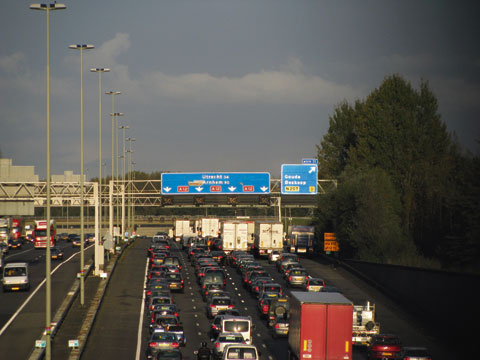A website that predicts the travelling times by car. Chris van Hinsbergens fileradar.nl is based on a method he developed during his PhD studies. The system determines which one of several models works best.
When Chris van Hinsbergen (faculty of Civil Engineering and Geosciences, Dynamic Traffic Management section) first started his research, he discovered that there were 130 different models to predict travel times by car. “I didn’t want to make model number 131,” he says. “I assumed that the best model would be found among the 130 that already existed. However, the question was how I could pick the one that makes the best prediction?”
Four years later and Van Hinsbergen has developed a fascinating method that determines what model could be used best. “To select the best model, one should take three steps. The first is to pick several you think will work best based on prior knowledge or a literature study and to use data to calibrate these methods. The second step is the numerical comparison of the models.
And the last step is to rank the models and select one or a few of the best models to actually make predictions in the field.”
With his method, Van Hinsbergen comes closer to determining what has been a mission impossible: to know exactly how long one will be on the road. “It’s difficult because there are many insecurities,” he explains. “Traffic is the result of human behaviour, which changes all the time.”
Nevertheless Van Hinsbergen and his colleague Frank Zuurbier have used the new method to set up a website, fileradar.nl (file being the Dutch word for ‘traffic’), that will predict how long one can expect to be on the road travelling to a particular destination. The researchers combine data about the occupation rate of the road and speed of the cars, which are measured, as well as historical data on past traffic jams on Dutch roads. The two budding entrepreneurs hope to have their new website online by April 2011.
Avondcolleges zouden slechter zijn, en minder motiverend, zegt de studentenraad. Studenten zouden de tijd buiten de colleges gebruiken om zich te ontplooien. Volgens de sr zouden studenten bij een 10-urenrooster een studieritme moeten creëren dat wisselt van dag tot dag. Er zijn bij de sr blijkbaar geen avondmensen. Wat zou ik er niet voor geven om avondcolleges te mogen volgen. Ik ben namelijk een avondmens. Mijn beste werk doe ik als het acht uur is geweest. Ik studeerde het liefst ‘s nachts voor tentamens, als het donker was, en het liefst met een feestje bij de buren dat je toch uit je slaap hield. Al mijn columns voor Delta zijn dan ook geschreven op rare tijden, vaak in beschonken toestand na een flinke slok ontplooiing. En waarom zou je de ochtenduren niet kunnen gebruiken om je te ontplooien? Ik sport graag in het daglicht, en ik moest colleges missen om overdag te kunnen hardlopen. Moet ik dan de sjaak zijn omdat ik mijn enkels niet wil breken op donkere paadjes? Lijkt me juist tof, die avondcolleges. Je kunt eerst lang uitslapen, shoppen als de winkels leeg zijn, ontplooiende dingen overdag doen die ‘s avonds niet kunnen – naar een museum bijvoorbeeld – en dan naar college gaan. En daarna de kroeg in, precies op het tijdstip dat het gezellig wordt! Niet dat ik naar colleges zou gaan, ik heb toch bijna geen colleges bezocht, maar ik zou graag de mogelijkheid willen hebben. Wel zo eerlijk. Ik zie ook niet in hoe een wisselend studieritme een slechte zaak is. Het zou de studenten juist in hun ontplooiing helpen, hen voorbereiden op de veranderende wereld. Want alles verandert. Plots moet je langer werken voor een kleiner pensioen, word je atol overspoeld door de stijgende zee of word je zonder enige voorbereiding verliefd op je buurmeisje. Of gaat je moeder ineens dood. C’est la vie – niets aan te doen. Je moet juist leren optimaal te profiteren van veranderende omstandigheden. Survival of the flexibelst is het. De sr en de rest van de studenten zullen maar moeten leren met de onzekerheden van het leven om te gaan. Want dat is het doel van al dat ontplooien – volwassen worden en tegen een stootje bestendig worden.
Dit was de laatste column van Michael Afanasyev voor Delta.



Comments are closed.